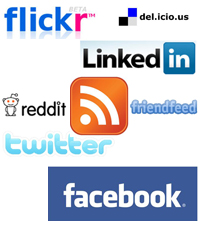When I was in University, everyone (including myself) typically used their laptop computers to type notes during class lectures. Row by row, most students would fervently copy the professor’s Power Point slides word for word, as if the exam were tomorrow. The irony was that note taking during a lecture often included MSN conversations, Facebook updates, Flickr views, and Twitter tweets. It was as if one couldn’t exist, let alone function, without the other.
If you were to stand at the back of a University class, I suspect that you would see an array of Facebook walls, Flickr thumbnails, and Twitter birds. In fact, you would probably see students bouncing back and forth from their Microsoft Word document to their Facebook home page.
Lecture or no lecture, social media is alive and active 24/7. This addict-like behaviour is neither subject to University students nor class lectures; however, it’s contagious and affects more than just our social lives.
The Diagnosis
 A recent Retrevo Gadgetology study shows that the majority of social media users are obsessed with checking their online networks throughout the day, and even in the middle of the night. According to this study, 48% of users check and or update their Facebook or Twitter during the night or soon as they wake up.
A recent Retrevo Gadgetology study shows that the majority of social media users are obsessed with checking their online networks throughout the day, and even in the middle of the night. According to this study, 48% of users check and or update their Facebook or Twitter during the night or soon as they wake up.
This obsessive behaviour suggests that a typical day is not quite the same without online activity and social media. Social media has become an obsessive habit as opposed to pastime. This may help to explain why most of us are conditioned multi-taskers, as if in a class lecture, note taking, tweeting, and Facebooking in between.
However, at what point does our online activity become too obsessive? Moreover, is there ever a time when we should remain offline and absent from all the noise?
From updating our foursquare location wherever we go to changing our status the moment we wake, social media is affecting more than just our online personas. It’s affecting the way we read news, retrieve information, and communicate with others. It’s even affecting our etiquette and table manners.
According to the Retrevo study, 40% of users say that don’t mind being interrupted during dinner for a message. Moreover, 32% said a meal was not “off limits” while 7% said they would even read a message during an intimate moment.
Taming the Addiction
Although not everyone is an obsessive tweeter or addicted blogger, it’s important to remain aware of how our online life may be affecting, or infringing upon, our real life relationships. As we know, social media is a powerful tool. It can enhance both our social interactions and immediate knowledge; however, it can also detract from many things including a peaceful sleep and class lecture.
Reflecting on my own online demeanour, I can’t help but laugh at the time I was irritated, and mildly upset, when foursquare was down due to technical difficulties. Although I have yet to wake up at 3am and tweet “I cannot sleep” I am confident that I can balance my online and offline relationships, addiction free.
What’s your take on this obsessive nature?




I’m surprised that this would come as a surprise to anyone. Every time a new fad comes along, everyone jumps on and studies indicate we’re obsessed with it. Such is the human condition. We are a compulsive obsessive species. Without it, we might never have left the cave. Of course, having that translate into a status line of “I’m so bored I can’t think of anything to put in my status line” is a serious climb down from inventing the wheel, discovering electricity, and landing on the Moon.
Whether it’s healthy or not is a separate issue. But the fact that we can’t leave it alone goes without saying. I think we need a study/poll on what percentage of people obsess over taking polls and surveys and how addicted they are to that.